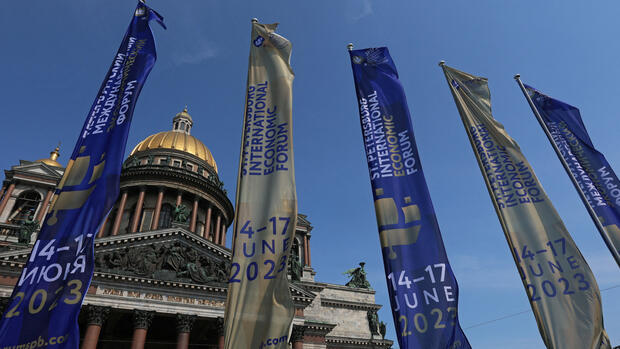Riga The International Economic Forum in Saint Petersburg was once of global importance. Year after year, well-known European company representatives traveled to do business with Russia. This year the event has a different character. The illegally annexed Ukrainian regions of Donetsk, Lugansk, Kherson and Zaporizhia are now at stands looking for investors.
According to the Russian political economist Alexandra Prokopenko, the forum is now “much more national and local”. Many international guests turned down an invitation this year. Even states whose leaders are not entirely opposed to Russia are keeping their distance at this year’s forum.
Kazakhstan’s government announced that President Kassym-Jomart Tokayev would not be traveling to the forum. Brazilian President Luiz Inacio Lula da Silva also declined an invitation, as did Serbian President Milorad Dodik.
The program shows that a large proportion of the speakers this year come from Russia itself. Mostly middle-ranking representatives up to ministerial level come from abroad from the Middle East and Latin America. From China, only the country’s ambassador to Russia and the head of the Chinese Entrepreneurs’ Association will take part.
The guest list shows that the sanctions imposed by the West also have an effect on countries that are not directly involved in the sanctions. According to Prokopenko, the Russian economy is now generally “less global” – albeit closer to China.
>> Read here: ECB puts pressure on – banks in the euro zone should leave Russia
Since the start of the full-scale Russian invasion of Ukraine and the resulting sanctions against the country, exports from Russia to the EU have plummeted, from over $23 billion worth of exports in January 2022 to $4.3 billion in March 2023. Also imports from the EU to Russia have fallen massively overall since the invasion.
China and India ‘won’t save Russian economy from further decline’
Exports to some other countries, on the other hand, increased, for example to China from 7.6 billion in January 2022 to almost 11 billion in March 2023. Russia is now also exporting significantly more to India. Because Russian agencies hardly publish any trade data anymore, the Brussels think tank Bruegel compiles such figures based on data from the relevant trading partners.
According to Russian economist Vladislav Inozemtsev, Russia’s “radical turning away from the outside world” since the start of the war against Ukraine is not simply part of an already ongoing deglobalization. Instead, Russia “turned its back on the globally interdependent economy”.
>> Read here: Why tensions could arise between Saudi Arabia and Russia
The connections to China or India would have “significantly reduced” the effects of Western sanctions, says researcher Prokopenko, who used to work as an advisor to the Russian central bank. But they would “not protect the Russian economy from further deterioration”. Russia is not in a position to “simply replace the West with China or India”.
According to Russian political economist Alexandra Prokopenko, Russia is not in a position to simply replace the West with China.
(Photo: AP)
So are the sanctions working better than it often appears in the West? It depends on which goal you are aiming for, according to Prokopenko. “If the goal was to stop the war, it was obviously missed,” she says. “But have they diminished the potential for economic development? Naturally!”
Although the Russian economy is doing far better than expected a year ago, the International Monetary Fund (IMF) is forecasting growth of 0.7 percent in the current year, while other institutes such as the Vienna Institute for International Economic Comparisons are forecasting no growth at all.
The situation is “still very unhealthy”, the recorded growth is “unsustainable”, says Prokopenko. “GDP growth is based to a large extent on growing military spending,” said the expert.
However, the extensive absence of Western politicians and business people at the business meeting in St. Petersburg is not a sudden development, as Prokopenko, who is currently doing research at the Center for East European and International Studies (ZoiS) in Berlin, explains: “The trend that massively fewer foreigners are taking part , started with the annexation of Crimea in 2014,” she explains.
Parallels to the Russian economic development
In fact, many top western politicians stayed away from the forum as early as 2014. The executive boards of large US companies such as Goldman Sachs or Pepsi only sent representatives from the second row following an official recommendation from the White House. The then Metro boss Olaf Koch, unlike the other Dax bosses, did not let himself be denied participation despite the annexation of Crimea.
“Since 2022 it has really become a ‘mission impossible’ to get international guests excited to take part,” says Prokopenko. The highest-ranking representative from Europe is now the Hungarian Foreign Minister Peter Szijjarto.
Also taking part is former Austrian Foreign Minister Karin Kneissl, known for her closeness to Russian President Vladimir Putin. In 2018, Putin was a guest at the wedding of the politician, who sat on the board of directors of the Russian oil company Rosneft until 2022.
Kneissl has been controversial since 2018 because of her relationship with Russian President Vladimir Putin.
(Photo: imago/ITAR-TASS)
The trend that Prokopenko describes is also reflected in the economy as a whole. As early as 2015, the Russian economist Sergei Guriev described how Putin wanted to anchor the country much more firmly in the international economic system at the beginning of his first presidency in 2000. In fact, however, he had pursued a protectionist policy. It was only in 2012 that Russia managed to join the World Trade Organization, a declared goal of Putin.
The crisis in Ukraine and the illegal annexation of Crimea in 2014 “changed everything”. Since then, Guriev has seen Russia on the “road to isolation”, characterized among other things by the introduction of Russian counter-sanctions such as import bans on food.
The forum in St. Petersburg runs until Saturday.
More: Russia’s government deficit is widening rapidly – but the Kremlin still has reserves.
